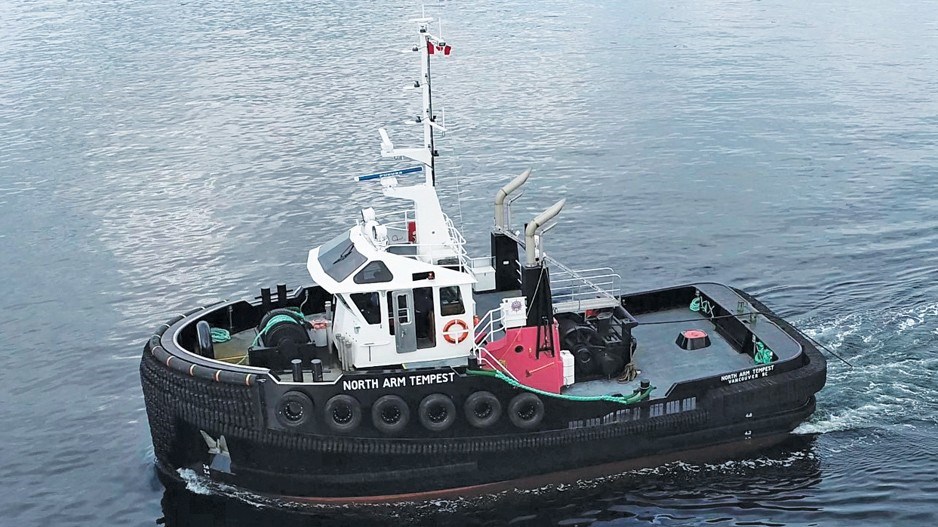A transport sector crucial to B.C. cargo movement may have been overlooked in the province’s COVID-19 tax-relief program, according to industry officials.
Tugboat and barge operators are responsible for moving all petroleum products to B.C. coastal communities, along with large amounts of construction aggregates, forestry exports and commercial goods along the province’s West Coast.
But industry officials said they recently discovered that tugboat costs are excluded from the B.C. provincial sales tax (PST) Rebate on Select Machinery and Equipment program, which allows companies to receive “an amount equal to the PST they paid between September 1, 2020, and September 30, 2021, on qualifying machinery and equipment.”
“From what I understand in other industries where machinery is covered, I’m surprise [at tugboats’ exclusion] because we are a significant industry to the province and the country as a whole,” said Phillip J. Nelson, president of the Council of Marine Carriers (CMC), whose members account for about 70% of the B.C. tugboat/marine transport market.
“We are an essential service during COVID and have not missed a delivery during the pandemic. We cannot just close the door and walk away if we feel like it; there would be a lot of British Columbians whose lives would suffer as a result.”
The issue emerged after Vancouver-based North Arm Transportation chartered a new $7 million tugboat to be built in late 2019 on a five-year commitment. North Arm then saw its business “significantly impacted” by the COVID pandemic starting a few months after ordering the new vessel, said general manager Matt Stradiotti.
When North Arm applied a few months ago to receive the PST rebate on the new tugboat, which began service this year, the company discovered that it was not eligible for the COVID-related financial aid.
“I thought they made a mistake,” Stradiotti said. “I thought [the exclusion] was unintentional. Tugboats and barges aren’t as common a capital asset as a pickup truck or a generator, so I thought a mistake had been made. So we inquired about that, and the response we got was that … the exclusion was intentional.”
A B.C. Ministry of Finance spokeswoman said that Class 7 assets – marine vessels, airplanes and non-electric vehicles – have been excluded, although no reason was given.
“Eligible items were specifically chosen to provide broad relief across the economy and include a wide range of tools, equipment and business inputs like office furniture or computers that may be eligible for a 100% rebate,” Sonia Lowe said in an email response. “The PST rebate is a direct response to what we heard when we consulted with the business community about how to encourage investments and reduce the cost of growth for businesses as we move into recovery.”
The ministry added that the supply chain sector may be eligible for other types of economic relief aid, such as a $16 million one-time program “for the Supply Chain Resiliency and Value-Added Manufacturing project to kick-start key sectors from COVID-19 impacts.”
Lowe said the program includes $10 million “to support projects that accelerate innovative capacity, strengthen provincial supply chains, sustain and create new economic activity in B.C.”
But Nelson said the tugboat industry council received no consultation beforehand on what kind of aid the industry needs to survive the COVID-driven economic downturn.
The PST rebate program supports electric vehicles. The BC NDP government has also identified zero-emission vehicle promotion and greenhouse gas emissions reduction as key to B.C.’s post-COVID economic direction.
The marine transport industry has made some headways on that front.
In May 2019, Seaspan ULC announced the addition of two liquefied natural gas (LNG)-battery hybrid cargo ferries to its fleet. It is unclear whether the vessels would qualify for a PST rebate, but Nelson added that – while the technology is emerging – the cost is prohibitive for most tugboat operators to consider.
“Seaspan has big pockets and big bills,” Nelson said. “They are a much bigger company and have greater resources than most tugboat companies. We also have some members who are right down to mom-and-pop shops in terms of size, where the owners are operators themselves with three or four employees. They’d be answering the office phones in between running the boats.”
He added that – if environmental sustainability is a provincial government priority – excluding tugboats from financial support makes even less sense.
“The marine industry in general – and the tugboat industry in particular – is an especially environmentally efficient method of moving bulk cargo around our province. If you take one 10,000-tonne barge, that’s 10,000 tonnes of cargo using one engine compared to 10,000 one-tonne trucks or 1,000 10-tonne trucks moving about. So comparing the emissions of 1,000 engines versus one engine, we are the most efficient.”
For Stradiotti and North Arm, the company is still trying to connect with the B.C. Ministry of Finance to make its case.
Stradiotti said he is “hopeful” that the provincial government would consider a legislative change on what qualifies for the rebate if the ministry considers “additional information” provided by industry.
He noted that – while some tugboat companies focused on construction goods have done relatively well during the pandemic – North Arm’s core business of supplying fuel and cargo to tourism-driven communities like Haida Gwaii has been hit hard by the pandemic in an industry where the profit margin was already thin.
And the pandemic arrived just a month after an eight-month strike at Western Forest Products (TSX:WEF) ended in February 2020.
The strike devastated tugboat operators and other northern Vancouver Island businesses that depended on forestry.
The CMC estimates its members employ 2,000 people directly, generate $527 million in annual revenue and contribute $745 million in annual economic output. •




